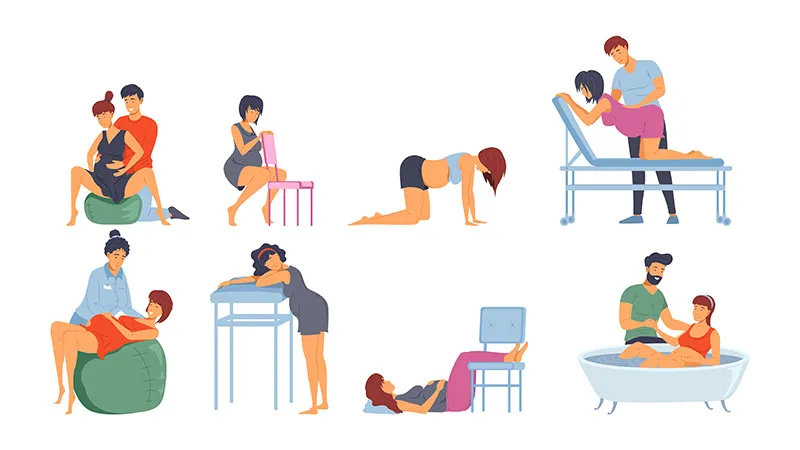Health and Social Care
How to Become a Midwife – Step by Step Guide
Working side by side with a physician and midwives, who are experts in the birthing process, can help you in having a healthy birth. Because women want a healthy, natural birthing process, midwives are now the ones who deliver every baby born in a hospital in the United Kingdom.
However, the majority of people are unclear about what a midwife does and how to become a midwife in the UK.
A midwife is a medical professional who has received training in helping and attending to women during pregnancy, labour, and delivery.
If you’re interested in learning more about how to become a midwife, you can check out this article.
Table of Content
What is the Role of a Midwife?
History
The term “midwife” first emerged around 1300. A midwife was someone who helped the mother as they gave birth.
Midwives were almost entirely women up until the 17th century, although the term “man-midwife” or “he-midwife” first appeared around 1600. In the early 18th century, upper-class British developed a strong preference for male midwives.
They used forceps for challenging births, which was partially a result of their medical training. The Chamberlen family, who had moved from France to England, created midwifery forceps in the 1600s. Up until the 1730s, their invention remained a family secret.
 Are you are looking for a Paediatric First Aid Online Course?
Are you are looking for a Paediatric First Aid Online Course?
Several Specific Roles
Here is an overview of the midwife’s specific roles:
- Working with women to promote self-care, maternal, baby, and family health.
- Respect for women as individuals with full human rights and for human dignity.
- Cultural sensitivity includes collaborating with women and medical professionals to end cultural practices that are harmful to pregnant mothers and babies.
- Focus on illness prevention and health promotion that recognizes pregnancy as a common life experience.
While providing care in often difficult environments, midwives all over the world follow these above principles. They help diverse populations as well as women who require social and health care due to their complex lives.
Further, they deal with serious social and economic inequality, differences in treatment, and results between services and populations.
They are therefore becoming more aware of the occurrence of mental illness in the perinatal period, the effects of domestic abuse and violence against women, and the impact of ethnicity and deprivation on the experience and results of pregnancy.
Midwife vs Nurses
The key differences between midwives and nurses are discussed below:
Midwife
In addition to giving birth, midwives focus on the medical needs of mothers. To work as nurse midwives, they must possess a licence, like most medical specialists.
They often work in medical offices or hospitals, and their timetables can change depending on where they are employed. A midwife may also have to be on call if a patient experiences pregnancy.
They perform the following tasks:
- Patient examination.
- Information on prenatal nutrition and disease prevention.
- Help surgeons during caesarean delivery by updating patient records.
- Manage any urgent situations that arise during delivery.
- Keep track of new mothers and babies.
Nurses
The majority of registered nurses work in hospitals, where they may be scheduled for the day, evening, or overnight shifts on any given weekday. Here, it is important to have a nursing licence.
They perform the following tasks:
- Monitor patients.
- Give medicines to patients.
- Update patient records.
- Get prepared to discharge patients.
- Express concerns to other medical staff.
How to Become a Midwife?
A career as a midwife is one of the most satisfying career choices. To ensure a healthy pregnancy and safe delivery, these highly trained experts work with women of all ages, including pregnant mothers.
In the end, they get to participate actively in the birth and care of adorable newborns, sharing at least some of the joys of new births. So, what do you have to do to become a midwife? You can just follow the process given below to find out.
Educational Qualification
More than just academic knowledge from nursing school is needed to become a midwife. To be successful in this position, they must learn a set of advanced nursing skills, practical nursing knowledge, and clinical experience.
The following information will give you an idea of what education do you need to be a midwife.
Get a BSN, or Bachelor of Science in Nursing.
Being a registered nurse is a requirement for becoming a Certified Nurse-Midwife (RN). An Associate Degree in Nursing and a Bachelor of Science in Nursing are the only two undergraduate nursing programmes that satisfy the minimum standards needed to become a registered nurse.
Succeed on the NCLEX-RN Test.
After receiving your BSN, you are qualified to sit for the National Council Licensure Examination, a national test for RN licensing that is necessary for all 50 states before you may start working as an RN.
The NCLEX-RN is a computer test that includes several similar scenarios that nurses could face in clinical practice.
Gain Skills Working as a Registered Nurse.
Before meeting the requirements for admission to a graduate nursing programme, a registered nurse typically has to have at least one year of experience working as an RN.
Because you need to develop a level of clinical knowledge and experience that will prepare you for the requirements of graduate school and the duties of a CNM, the type and scope of your job as an RN are crucial.
Apprenticeship
You can do a midwife degree apprenticeship as a combination of in-person training and academic study. At an academic institution, this usually takes 48 months to complete.
For a degree apprenticeship, you’ll typically need 4 or 5 GCSEs with grades 9 to 4 (A* to C), as well as A levels or an equivalent.
You will be required to show an awareness of how NHS values apply to your job while applying for degree programmes and apprenticeships.
Skills and Experience
Midwives offer guidance, care, and support to mothers and their unborn children during pregnancy, labour, and the early newborn. So, what skills do you need to become a midwife? The following are some of the fundamental skills you need:
- Medical and newborn care skills.
- Sensitivity and awareness.
- Understanding of psychology.
- Customer service skills.
- The ability to take criticism and perform successfully under pressure.
- The ability to care and pay attention to detail.
- Patience and the skill of being calm under pressure.
- To be able to use a computer or other handheld device to perform simple tasks.
It is always advisable to take training to gain experience as it has many advantages. Some essential training to be a midwife involves implementing skills in the right way. Check out NHS Careers, which has more information about the training programmes and the work that midwives conduct.
Professional Degree
The Nursing & Midwifery Council Nursing & Midwifery Council has approved a degree programme in midwifery. 3 years are required for full-time study. The NHS Learning Support Fund may be able to provide you with additional financial help.
You can enrol in a postgraduate midwifery study if you already have a degree. Typically, you’ll need 2 or 3 A levels, including a science or a level 3 diploma, or admission to higher education in health, science, or nursing and a degree in a subject relevant to postgraduate study.
So, what GCSEs do you need to be a midwife? You will need 5 GCSEs in grades 9 to 4 (A* to C), or equivalent, English, maths, and science.
How Long Does It Take to be a Midwife?
A demanding and unique profession is being a midwife. To ensure the pregnant woman has the best birthing experience possible, a midwife must build and maintain a strong relationship with her.
You’ll need a three-year midwifery degree to get your career in this field off to a strong start. A shorter programme that lasts 18 months is available if you are currently a qualified adult nurse.
How to Become a Midwife Without Going to University?
Without attending university, it is not possible to become a midwife. You must complete a midwifery degree.
The Access to Higher Education Diploma in Midwifery allows students who did not take or received lower scores at A level. Older candidates tend to favour this option if they do not have the A-level grades to get into university.
Duties and Responsibility
The following are some of the primary responsibilities of a midwife:
- Monitoring the health of expectant mothers and their newborns before and after delivery.
- Teaching patients and their loved ones about reproductive health and prenatal and postnatal care.
- Preparing patients for birth by teaching them how to control pain.
- Giving birth at hospitals, birthing facilities, or patients’ homes.
- Taking and documenting the patient’s temperature and blood pressure.
- Educating new mothers on how to feed their babies properly.
Top Courses of this Category
Salary and Facilities
According to Prospects,
- The Agenda for Change pay scale, which is a fixed pay scale for midwives employed by the NHS, determines their salary. Newly licenced midwives are paid at Band 5, which begins at £25,655.
- After that, you can go to Band 6, which is worth between £32,306 and £39,027.
- Pay ranges from £40,057 to £45,839 at Band 7, where you’ll be working at a more senior level, such as managing a team.
- Nurse consultant wages, ranging from Band 8b to Band 8c and starting at £54,764 to £75,874, are among the highest-paid nursing positions.
FAQ
Is it hard becoming a midwife?
The road to becoming a nurse-midwife is challenging. A long education and clinical preparation process are required for this profession.
Do student midwives get paid?
According to Stuff graduate midwives start on about $54,000.
Do I need a degree to be a midwife?
Yes. The majority of midwives hold a Bachelor’s Degree in Nursing (BSN) or a closely related field as a minimum.
Is midwifery a good career?
Yes. It’s possibly one of the most rewarding and fulfilling professions you could choose.
Do midwives deliver the baby?
A midwife is a qualified healthcare provider who supports women during pregnancy, childbirth, and newborn care.
Are midwives in high demand?
A career as a midwife can be attractive in addition to demand because they perform with a high level of responsibility.
How many hours does a midwife work a day?
Your typical work week will be 37.5 hours long, broken up into shifts that may encompass nights, early mornings, evenings, weekends, and holidays.
What advice would the RCM give to help me make my application stand out?
They will advise making your application simple to read.
How do I prepare for the interview?
To prepare for the interview you should dress formally and be clear about why you want to begin a career in this field. You should also research the exact roles and responsibilities that you need to perform in this profession.
What does a midwife do?
Healthcare professionals known as midwives specialise in pregnancy, childbirth and newborn care.
Conclusion
People commonly connect midwives with childbirth. Typically, a woman’s first and primary point of contact with a midwife during her pregnancy. Childcare and supporting women in making educated decisions about their care are the responsibilities of midwives.
As mentioned above there are many ways to become a midwife. However, irrespective of the route you choose, make sure you do your research and pick the option that is best for you.
What to Read Next:
- Why do You Want to be a Carer – Top 20 Questions and Answers
- Can Social Services Force Someone Into a Care Home
- Child Development Theorists Cheat Sheet – Everything you Need to Know
- What is confidentiality in health and social care – How ensure it
- Environmental Factors That Affect Child Development
- What is the Most Enjoyable Part of Care Work
- How to Become a Mental Health Support Worker?
















